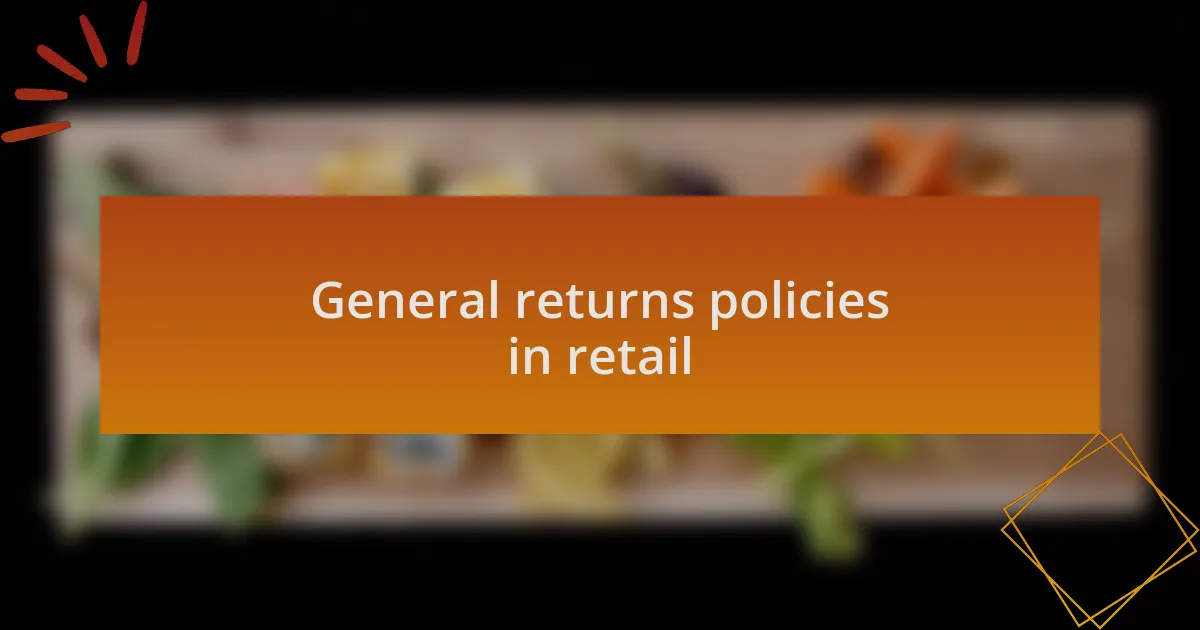Key takeaways:
- Returns policies for cannabis edibles are often strict due to the consumable nature of the products, impacting customer experiences.
- A well-crafted returns policy enhances customer confidence, reflecting a brand’s commitment to satisfaction and fostering loyalty.
- Common issues with cannabis edibles include inconsistent potency, taste, and timing, necessitating clear communication and flexible return options.
- Improving return processes through user-friendly policies and feedback mechanisms can significantly enhance customer satisfaction and retention.

Understanding cannabis edibles returns policy
Understanding a returns policy for cannabis edibles is crucial, as it directly impacts your purchasing experience. I remember my first time trying to return an edible that just didn’t sit right with me. It was a frustrating experience because, like many, I expected a more lenient approach, given the nature of the products.
It’s essential to know that most companies typically have strict guidelines around returns, especially since edibles are consumable items. I find myself wondering, how fair can we expect a policy to be when we consider the unique way each individual reacts to these products? It’s an important question because everyone’s experience with cannabis edibles can vary wildly.
Interestingly, I’ve noticed some brands offer solutions such as exchanges or store credit instead of straightforward returns. This approach can feel more customer-friendly, but it also raises questions about how well they understand their products and their customers’ needs. Reflecting on these aspects can help consumers navigate their options more effectively when they encounter an unsatisfactory product.

Importance of returns policy
A well-crafted returns policy serves as a safety net for consumers, allowing them to shop with confidence. I vividly recall a situation where a friend purchased a cannabis edible only to find that it was far too potent for their liking. Without a clear returns policy, they felt stuck and hesitant to try new products in the future, which shouldn’t be the case.
Returns policies also reflect a company’s commitment to customer satisfaction. When I see a brand that’s willing to accommodate returns, it tells me they trust their customers to know what’s best for them. But here’s a thought—does a flexible returns policy indicate confidence in product quality, or is it just a marketing tactic? Personally, I lean towards the former; it demonstrates that the company understands the diverse experiences users might have with their edibles.
Moreover, a transparent returns policy can foster loyalty among customers. I often think about how I’m more likely to return to a brand that stands behind its products. It creates a sense of partnership between the company and the consumer, encouraging open communication about what works and what doesn’t. This relationship can be pivotal in a market that thrives on personal experience and trust.

General returns policies in retail
Returns policies in retail serve as a fundamental aspect of customer service, creating a safety net that can significantly enhance shopping experiences. I often think about the first time I faced a return issue—after buying an item that didn’t meet my expectations, the stress of navigating the return process left a lasting impression. It felt like a test of trust between me and the retailer; their willingness to facilitate returns could have easily turned my frustration into satisfaction.
In my experience, a straightforward returns policy can also influence purchasing decisions. How many times have you hesitated to buy something pricey, fearing that it wouldn’t be what you hoped for? I remember once passing on a gourmet product because the returns process seemed complicated. That moment made me realize just how crucial it is for consumers to feel secure about their purchases, especially when trying something new.
Flexibility in a returns policy often reflects a brand’s understanding of consumer needs. It’s a reminder that not every product will be a perfect fit for every person; after all, we all have unique preferences. I genuinely admire companies that openly embrace this concept, as it fosters an atmosphere of trust. When I see a retailer take that step, it’s like they are saying, “We understand you—let us help you find the right fit.” That kind of reassurance makes all the difference in my shopping journey.

Common issues with cannabis edibles
When it comes to cannabis edibles, one of the most common issues people face is the inconsistency in potency. I’ve personally experienced this disconnect—one chocolate bar left me feeling relaxed and content, while another left me feeling anxious and unsure. Have you ever been caught off guard by the strength of an edible? This unpredictability can make dosing a challenging game of trial and error, which is especially frustrating for those seeking relief without the unwanted side effects.
Another frustrating aspect is the taste and texture of some products. I recall trying a gummy that was so sugary it masked any hint of cannabis flavor. While that might sound appealing at first, the artificial taste left me longing for something more genuine. It raises a question: Should we sacrifice quality for flavor? For many consumers, finding an edible that meets both their taste preferences and desired effects can feel like searching for a needle in a haystack.
Lastly, timing is a crucial element that many beginners overlook. I remember my first time trying a cannabis brownie, eagerly waiting for effects to kick in only to realize I had consumed it too quickly. Understanding how long it takes for edibles to metabolize is essential. This knowledge can prevent the disappointing experience of underestimating your dosage or, worse, going overboard. Navigating the world of edibles requires patience, and I often wonder how many others share similar experiences of impatience or mishaps?

Personal experiences with returns policy
When it comes to returns policies for cannabis edibles, my personal experience has been a mixed bag. I once received a pack of gummies that just didn’t match the advertised potency. After realizing they weren’t working for me, I contacted customer service, hoping for a straightforward return. Surprisingly, they were very accommodating, which alleviated my frustration and left me feeling appreciated as a customer.
On another occasion, I had a chocolate bar that arrived damaged during shipping. I was worried about the hassle of the return process, but to my relief, the company responded quickly. They sent me a replacement without requiring the return of the damaged product. That kind of thoughtful service made me more likely to shop with them again, and it taught me the importance of reliable customer support in the cannabis industry.
However, I’ve also experienced a return that didn’t go as smoothly. I tried to return a product that, unfortunately, was not eligible due to their strict policy on opened items. This left me feeling a bit disheartened, as I had hoped for more flexibility. It got me wondering: Shouldn’t customer satisfaction be the priority in such a rapidly growing market? Such experiences really shape how I view a company’s commitment to their customers, and I believe that a fair returns policy is crucial for building trust.

Suggestions for improving returns
When considering how to improve returns policies for cannabis edibles, one aspect that stands out is the need for clearer communication. I remember a time when I was left in the dark about the specifics of a return. It felt frustrating to guess what was acceptable and what was not. Providing detailed guidelines on the website could really help customers feel more secure in their purchases.
Additionally, implementing a more user-friendly return process would be beneficial. I once encountered a convoluted procedure for returning an item, which only added to my disappointment. Simple steps like allowing returns for opened items under certain conditions or offering store credit could turn a negative experience into a positive one. Isn’t it worth considering how flexibility could retain customer loyalty?
Finally, creating a feedback loop where customers can share their experiences directly after the return process could enhance future offerings. I often wish there was a place to express my suggestions or concerns right after the return, as my sentiments are still fresh. By taking customer feedback into account, companies can continually refine their policies, catering to the evolving needs of their clientele. Wouldn’t that be a win-win for both parties?

Conclusion on returns policy effectiveness
The effectiveness of a returns policy can significantly influence customer satisfaction. I remember purchasing some cannabis-infused candies that didn’t match what I expected in taste or potency. This experience made me realize how important it is for a returns policy to not only exist but to be clear and effective. A well-structured policy could have eased my mind at the time and made me feel valued as a customer.
Poor returns experiences can lead to lasting negative impressions. For example, I once struggled with an extensive form and complicated steps to initiate a return, which dampened my enthusiasm for future purchases. A straightforward, hassle-free process would have left me feeling cared for instead of frustrated. Have companies considered how a smoother returns experience could enhance customer retention?
Ultimately, the returns policy acts as a reflection of a brand’s commitment to its customers. I often think that when a company prioritizes transparency and ease of returns, it sends a clear message that they stand behind their product. Isn’t it crucial, then, for companies to approach their returns policies as a cornerstone of customer trust and loyalty? When returns are handled thoughtfully, they can turn potentially negative situations into opportunities for connection and satisfaction.